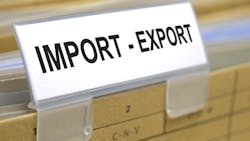Just as they tell you to do in the civics textbooks, Don Nelson has met with his congressman and others in Washington several times to explain how important a threatened government program is to his business. But Nelson, president of ProGauge Technologies in Bakersfield, Calif., says it has done him no good.
Nelson’s congressman is House Majority Leader Kevin McCarthy, an influential critic of the Export-Import Bank of the United States, whose authorization is set to lapse today despite months of lobbying by the National Association of Manufacturers and other business groups. At a press call organized by NAM, Nelson said 65% to 70% of his business – steam generators and other equipment for the oil industry - involves exports and that he will have to forfeit millions in contracts if the bank’s charter expires. He noted that McCarthy and other critics have repeatedly argued that the Ex-Im Bank is unnecessary and that its financing services can be handled by private banks.
“To me it shows that these critics have little conception of the realities of international trade and finance or the challenges that smaller businesses like us face competing for global customers and markets,” Nelson told reporters. “In fact, I’d say it’s clear that few of them have ever run a business or met a payroll.” He said McCarthy and his allies “don’t have a clue what they are doing or the damage they are going to inflict on small businesses in America by closing the Ex-Im Bank.”
McCarthy and other congressional critics "don't have a clue what they are doing or the damage they are going to inflict on small businesses in America by closing the Ex-Im Bank."
—Don Nelson, president, ProGauge Technologies
The Ex-Im Bank was set to guarantee a long-term loan so the government of Ghana could purchase a bridge from his company, said Dick Rogovin, chairman and chief legal counsel at U.S. Bridge, a manufacturer of steel truss bridges headquartered in Cambridge, Ohio. He told reporters the contract was worth nearly $100 million.
“In the absence of Ex-Im Bank, there is no commercial U.S. bank that will perform the same service,” Rogovin said. He added that he had asked McCarthy’s office for a list of private banks that could provide the loan guarantee. By this morning, Rogovin said, they had not provided him a list. Rogovin said he had contacted several large U.S. banks and “there wasn’t anybody who was willing to extend loan guarantees to third world countries for long terms. They just wouldn’t do it.”
Both Nelson and Rogovin said failure to reauthorize the Ex-Im Bank would result in layoffs at their companies. Nelson said ProGauge currently was bidding on a large project in the Middle East. He said his company was proceeding as if the bank will be reauthorized. If it is not reauthorized before the bid is awarded, he said, ProGauge will have to forfeit the project, worth $30 million.
“The reality is we can’t export any longer because we can’t provide bank guarantees,” said Nelson. “We’ll be forced to reduce our workforce that feeds our export business.”
No One is Backing Down
In Washington, the groups that have been battling over the trade bank kept up their lobbying efforts. Business groups such as NAM warned of dire consequences to U.S. businesses if the bank were to go out of business.
“Today, a minority of lawmakers in Washington caused America to wave the white flag in the battle to keep selling U.S. products overseas,” charged NAM CEO and President Jay Timmons. “Governments in Seoul, Berlin and Beijing are celebrating a clearing field of competition with the expiration of the Ex-Im Bank’s charter, while American companies, including small and medium-sized businesses, are losing their shot at large-scale projects, and communities across the nation are at serious risk of losing stable, high-paying jobs.”
But Ex-Im Bank critic Veronique de Rugy, an economist and senior research fellow for the Mercatus Center at George Mason University, said the day would be remembered as “a day Americans stood up to powerful special interests and won.”
“Americans are sick of cronyism, and the Export-Import Bank is the epitome of cronyism,” she added. “Activists from the Tea Party to Occupy Wall Street agree that it’s time to put an end to the unhealthy marriage between government and big business.”
Congress is expected to take up bank reauthorization when it returns from its July 4 recess. Reauthorization could either be included with a bill such as highway funding or in a standalone bill, said Aric Newhouse, NAM’s senior vice president for Policy and Government Relations. Newhouse said there was strong bipartisan support for the bank in both houses of Congress.
About the Author
Steve Minter
Steve Minter, Executive Editor
Focus: Leadership, Global Economy, Energy
Call: 216-931-9281
Follow on Twitter: @SgMinterIW
An award-winning editor, Executive Editor Steve Minter covers leadership, global economic and trade issues and energy, tackling subject matter ranging from CEO profiles and leadership theories to economic trends and energy policy. As well, he supervises content development for editorial products including the magazine, IndustryWeek.com, research and information products, and conferences.
Before joining the IW staff, Steve was publisher and editorial director of Penton Media’s EHS Today, where he was instrumental in the development of the Champions of Safety and America’s Safest Companies recognition programs.
Steve received his B.A. in English from Oberlin College. He is married and has two adult children.
